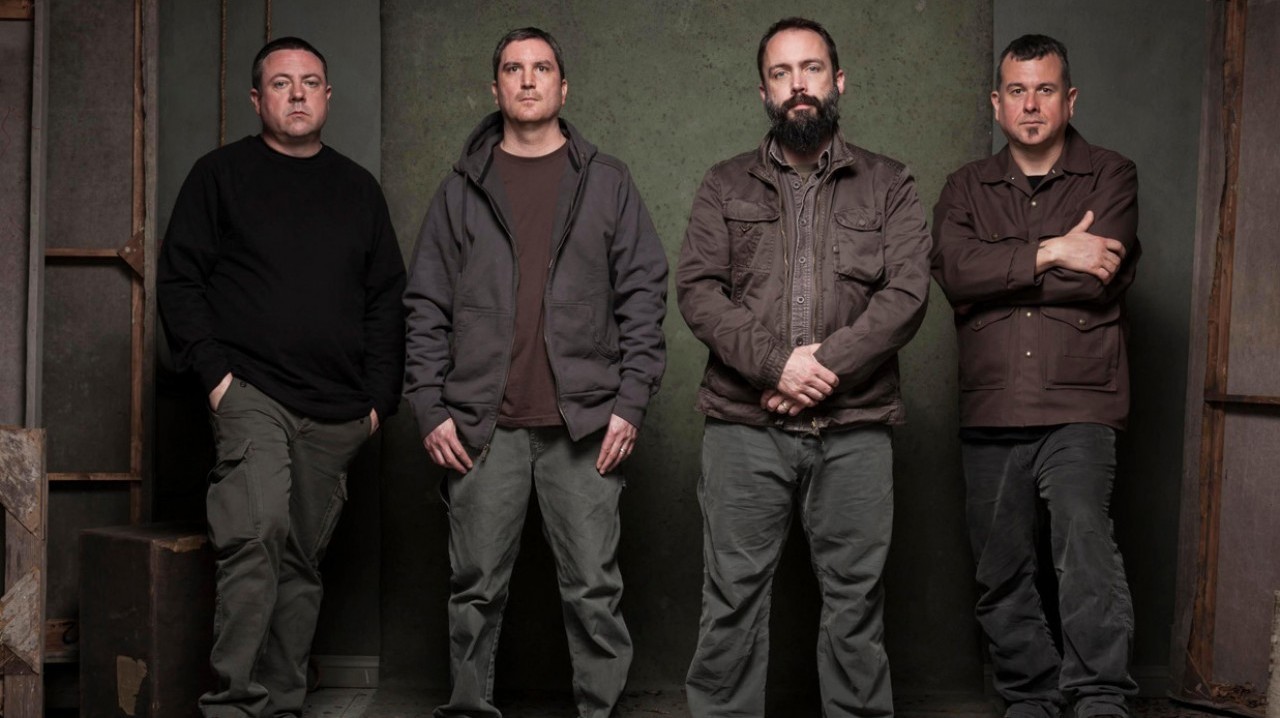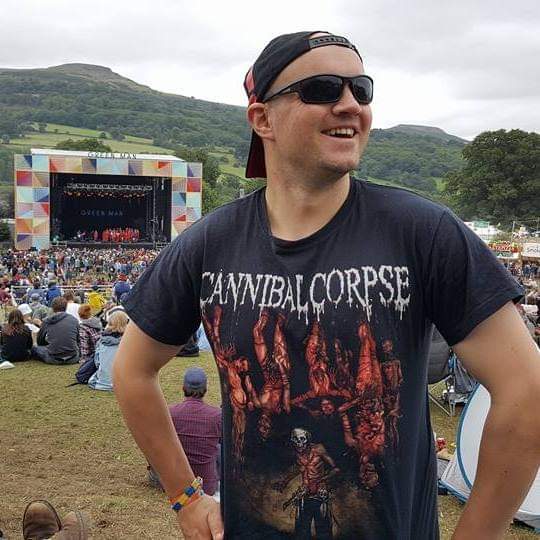Since the release of their debut album in 1993, Clutch have been doing things their way. With no desire to follow trends or conform to what is or isn’t metal, the bluesy, stonery, funky rock ‘n’ rollers have built a career and a dedicated fanbase on the back of integrity and stone-cold talent.
As the band start to work on new material for what will be their twelfth album, we caught up with frontman Neil Fallon to talk about how he sees the world of rock and metal, from a vantage point on his own island.
Will we ever see metal bands get big enough to headline the world’s biggest festivals?
“I guess that remains to be seen, and I don’t really see anyone taking the places of the [old] bands once they dissolve for whatever reason. Those bands, particularly Iron Maiden, who got their sea legs in the ‘70s and ‘80s during the golden age of metal, they learnt how to play onstage – and you can only really learn that from playing venues that large.
“Then of course in the late ‘80s and into ‘90s that particular kind of metal didn’t see much of a turnout. Now it’s thankfully enjoying a renaissance, and I don’t really see that ebbing because the internet is allowing it to supersede terrestrial radio, tastemakers and A&R reps. When that day comes it might be bittersweet for a lot of us, but there’s always great music being made. Even if we’re not privy to it, I guarantee it’s happening right now somewhere in the world.”
How do we nurture bands coming through?
“Clutch is in a unique position. When we started we played the very traditional game with record labels, advances and album cycles, which is a very old business model that dates back to the ‘60s. Then we switched gears and started releasing stuff on our own after having established a fanbase. I do not envy any band that’s looking to start out now and compete with the tens of thousands of bands you can get on your phone and on your desktop; it’s an embarrassment of riches. I think it sucks that a band has to be compelled to do wacky social media to be recognised. It should just be about the music but it’s got to be so damn hard to be heard when there’s so much static out there.
“Maybe it’s easy for us to say, ‘Well just start your own label’. But if any band is in the position to get music to their fans without all the middlemen they really should, it makes it more accessible for them and in the long run, from a financial view, it’s good for the band.”
It sucks that a band has to do wacky social media to be recognised
How should the scenes and festivals adapt?
“As far as festivals go, in the United States we’re still playing catch up with the UK and Europe. Until recently they were so genre-specific that they excluded a lot of people. In Europe and the UK it’s a lot more diverse, which I think is good for any festival because it makes for a better experience.”
Is it important to keep showmanship alive or does metal not need to worry about it? Do we need to support the bands who ramp up the theatricality element or big stage productions?
“For sure. There are different schools of what should and shouldn’t be done on stage: I like it all. I mean I don’t want to see a stripped down Rammstein show, I want to see more fire and more explosions, because that’s what that is. But at the same time there’s a lot to be said about not having anything between you and the band. It means for us we can play Download one day and then play a small pub 200 miles away with the exact same stage set up, not being subordinate to a production. I know bands that have to play the same setlist because their lighting director can only play the lighting cues in that order. That would make my eyes bleed if I had to do it.
“You can take enjoyment out of the theatrical and visual aspects of the stage show, and take enjoyment from not having any of that. I’m all for both. Personally I’m too scared of having pyro on stage, I want it at arms length.
“But I can see the difference between a band sees the theatrical value of something like that and a band that’s using as a security blanket. There are bands that we’ve toured with where the frontman says the same thing between every song, foot up on the monitor at the same point. To me that’s not performance, that’s a recital.”
- Clutch frontman Neil Fallon's Guide To Go-Go
- The 10 albums that changed my life, by Clutch's Neil Fallon
- The 11 best Clutch songs, as chosen by CKY
- Read Classic Rock, Metal Hammer & Prog for free with TeamRock+
Does metal need the mainstream?
“Not that I’ve ever had long hair, but I have a romantic, sentimental feeling that if you had a metal t-shirt and long hair you were labelled as an outcast. Now it doesn’t attract that kind of social perspective as much – out in the sticks in parts of the world it does for sure – but in the United States it’s much more common. You can go to a metal concert and you’ll find people who have grown up metal and become mothers and fathers, have jobs but they’re still metal fans. As far as becoming mainstream, that isn’t exclusive to metal, it’s happened to hip-hop and punk, which were initially taboo in a lot of ways but in some ways they became victims of their own success. There’s always some band playing somewhere that’s going to kick that in the teeth and reinvigorate those genres. The compulsion to make exciting music is thousands of years old and that’s not going to stop because of the internet or fashion sense.”
The best art is the one that surprises us
Is metal doing enough to diversify audience?
“If I have one criticism it’s that it tends to be purist to a fault and close-minded to a fault, and that if it doesn’t fit in certain parameters then it’s not metal. To me metal had its beginnings the same way punk rock did, as rebellion against standardisation of norms. It kind of became what it was against to some degree. But I get it. If you’re 17 years old and you’re not part of the football team, and you find friends with similar interests and a camaraderie, so you want to dress the same, I get that.
“If someone is elitist like that it’s not about music anymore. It’s about branding yourself and it gets ridiculous when people are drawing the finer points between black metal, death metal and grindcore – it’s kind of like living in a fishbowl. If that’s all you listen to it beholds you to look around a little bit and inform your music tastes by looking at other things on the menu.”
Where are all the scenes? Should we be looking further afield for metal’s future?
“Music is a lot more egalitarian and the proof will be in the pudding. I’m thinking of the late ‘80s when a lot of bad bands were shoved down people’s throats, but that’s my personal opinion. I think it’s healthy, too. For me I find it more interesting to hear a band from Africa’s take on blues or metal or rock ‘n’ roll, than a band that lives within 20 miles of me because it’s refreshing and maybe a bit challenging. I think there’s a phenomena with music across any genre, the best music seems to come from dire circumstances. I think music loses its vitality when it becomes institutionalised or easy. Whether it be blues, punk or heavy metal, the wellsprings of those genres came from really rough places, and then it became popularised. I’m not trying to say that it beholds us to look at music from rough places but it beholds us to look deeper and we’ll certainly find it.
“One of the cool things, having toured as much as Clutch has, is that I have learned a lot about music. I thought I knew a lot about music, I thought I knew it all when I was 21 but realised how little I did know. I want to be surprised, I don’t want to be able to predict it. The best art is the one that surprises us.”
In Metal Hammer 300, we gathered the biggest and best names in metal to debate the genre we love. Is metal in danger of stagnating? Do we take ourselves too seriously? What is metal anyway? Find out in Metal Hammer issue 300 – in stores and available to buy online now.
You can also read all of the issue 300 on TeamRock+ right this second.
Stone Sour, Korn, Ghost, Lamb Of God, Megadeth and more star in Metal Hammer 300

